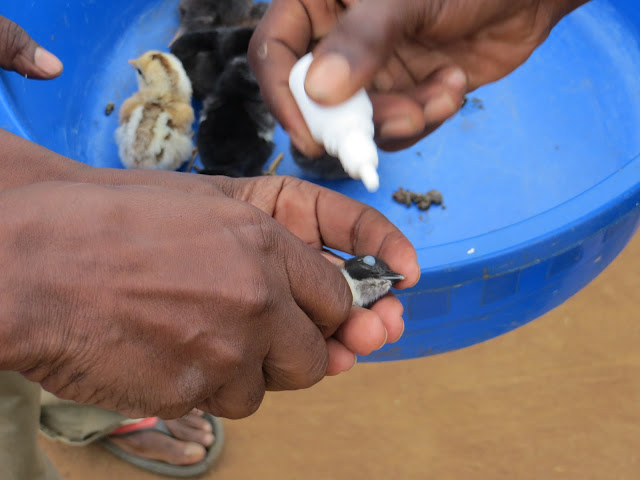 |
Chicks receiving their KUKUSTAR vaccinations.
|
It has become common knowledge that the
youth hold the power to change our future. The same goes for the poultry world.
A generation of healthy, young birds will not only help prevent the dreaded
Newcastle Disease from spreading and wiping out the poultry population, but it will
help provide a better future for the household of a rural poultry farmer
looking to get out of poverty.
One of the biggest threats to young domestic birds is Newcastle Disease, a virus that is 100% fatal in chicks and wipes out newly hatched birds in days. The virus is easily spread through contact between healthy birds and bodily discharges from infected birds, whether it is through direct contact or through a third party like shoes and clothing of a human being. What makes it even more lethal is that the virus can survive for several weeks in this state. So how should we protect these vulnerable, young birds?
One of the biggest threats to young domestic birds is Newcastle Disease, a virus that is 100% fatal in chicks and wipes out newly hatched birds in days. The virus is easily spread through contact between healthy birds and bodily discharges from infected birds, whether it is through direct contact or through a third party like shoes and clothing of a human being. What makes it even more lethal is that the virus can survive for several weeks in this state. So how should we protect these vulnerable, young birds?
In the past there has not been much of an option for one-day old chicks because the only vaccine available was the LaSota strain, which makes them fall sick. For this reason, they have had to be vaccinated with a different type of vaccine called the B1 strain and then, when the birds are 14 days old, they must get another vaccination with a booster dose of the LaSota strain. Other challenges with this vaccine is that it is only for chickens, is administered primarily through drinking water or aerosol spray, which is not conducive to the habitat of free-range poultry which do not usually have designated drinking sources and because most households only have a few birds. Furthermore, the LaSota vaccine is not thermostable at room temperature and as a result, it can only be used for three hours once it leaves its refrigerated state, thus making it inaccessible to most rural poultry farmers living in poverty. Beyond three hours at room temperature, the vaccine is no longer effective.
With the I-2 Thermostable KUKUSTAR® Newcastle Disease vaccine, we are able to vaccinate day-old chicks and other poultry in the same method and intervals as we would adult birds (through an eye drop once every three months), and without the need of a booster vaccine. It can also last up to three days at room temperature, allowing us to reach farmers and their young poultry in rural settings. KUKUSTAR® is affordable, easy to administer, thermostable, and straightforward. Most importantly, it gives these young birds a fighting chance against the killer poultry disease while also giving farmers the opportunity to improve their household income and livelihood through increased turnover of free-range poultry.





